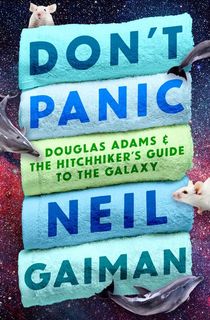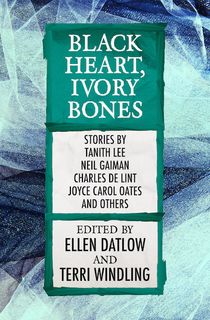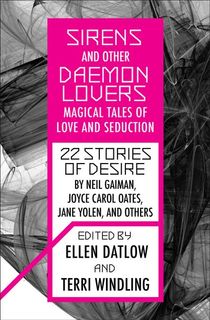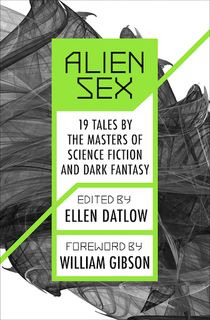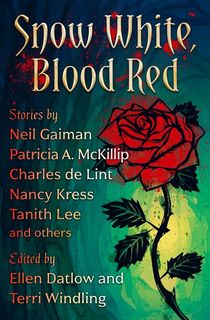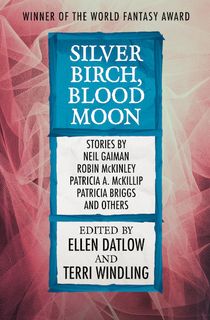Neil Gaiman’s imagination knows no bounds. The British writer skillfully weaves sci-fi and fantasy stories, injecting a fresh new perspective on these genres by putting his own spin on well-known mythology, and even creating a few new myths of his own. Untethered from any one mode of storytelling, Gaiman has produced work in such varied mediums as novels, short stories, screenwriting, comic books, and graphic novels. As you can imagine, his work is full of insightful commentary about everyday struggles.
In honor of his birthday on November 10th, we're celebrating with these great Neil Gaiman quotes. These words of wisdom reveal what the Hugo and Nebula Award-winning author has to say about everything from mortality to the pangs of growing up.
RELATED: 16 Must-Read Neil Gaiman Books
“Books are the way that we communicate with the dead. The way that we learn lessons from those who are no longer with us, that humanity has built on itself, progressed, made knowledge incremental rather than something that has to be relearned, over and over. There are tales that are older than most countries, tales that have long outlasted the cultures and the buildings in which they were first told. I think we have responsibilities to the future.”
Gaiman uttered this quote during a 2013 lecture at the Reading Agency titled, “Why our future depends on libraries, reading and daydreaming.” A firm supporter of free speech rights, Gaiman argued that people, especially children, should be able to access libraries and read books free of censorship. Not only are books a tool for personal growth, Gaiman says, but they contain vital knowledge that helps propel all of humanity forward.
“Life is life, and it is infinitely better than the alternative, or so we presume, for nobody returns to dispute it.”
Musings about life and death are common in Gaiman’s work. This tongue-in-cheek observation originates from his book Trigger Warning. The collection of short fiction contains a variety of compelling stories, from a special Doctor Who tale (Gaiman has written two episodes of the beloved show), to a story inspired by his Twitter interactions with fans, to a parody of Sherlock Holmes. The book is proof of his ability to transform everyday interactions and well-worn stories into something new, just as he does with this clever quote about death.
“Grown-ups don't look like grown-ups on the inside either.”
Gaiman perfectly encapsulated one of the most important lessons you learn when you’re growing up – that adults aren’t all-knowing beings, but rather regular humans fumbling through life with a “fake it 'til you make it” mentality. This particular quote is from The Ocean at the End of the Lane, a haunting novel about a man who returns to his childhood neighborhood, where he recalls memories he hasn’t thought of in years and explores the disconnect between childhood and adulthood.
“You grow up reading about pirates and cowboys and spacemen and stuff, and jus' when you think the world's full of amazing things, they tell you it's really all dead whales and chopped-down forests and nuclear waste hanging about for millions of years.”
This quote about the harsh realization of our planet’s plight is from Good Omens, a collaborative effort between Gaiman and fellow author Terry Pratchett. The novel is a hilarious take on the impending apocalypse, complete with the lost city of Atlantis rising from the sea, frogs falling from the sky, and a wacky adventure with the Antichrist himself.
“Some years ago, I was lucky enough [to be] invited to a gathering of great and good people: artists and scientists, writers and discoverers of things. And I felt that at any moment they would realise that I didn’t qualify to be there, among these people who had really done things. On my second or third night there [...] I started talking to a very nice, polite, elderly gentleman about several things, including our shared first name. And then he pointed to the hall of people, and said words to the effect of, "I just look at all these people, and I think, what the heck am I doing here? They’ve made amazing things. I just went where I was sent." And I said, "Yes. But you were the first man on the moon. I think that counts for something." And I felt a bit better. Because if Neil Armstrong felt like an imposter, maybe everyone did.”
This passage is from a post on Gaiman’s Tumblr, where he often interacts with fans and gives them advice on topics like “imposter syndrome.” Readers struggling to take credit for their successes should be heartened by the fact that even groundbreaking members of society like Neil Gaiman and Neil Armstrong have had similar experiences.
“One of the joys of comics has always been the knowledge that it was, in many ways, untouched ground. It was virgin territory. When I was working on Sandman, I felt a lot of the time that I was actually picking up a machete and heading out into the jungle. I got to write in places and do things that nobody had ever done before.”
Gaiman’s comic book The Sandman changed people’s expectations of what graphic storytelling can be. The series combined horror, fantasy, and humor in a way that had never been done before, to great success – sales for The Sandman surpassed even Batman and Superman. Though the series is based on an old character, Gaiman reworked the story of the Sandman, who is a personification of Dream. As this quote from an interview with Wild River Review reveals, uncharted territory is where Gaiman thrives creatively.
“Always worth it to have tried, even if you fail, even if you fall like a meteor forever. Better to have flamed in the darkness, to have inspired others, to have lived, than to have sat in the darkness, cursing the people who borrowed, but did not return, your candle.”
Gaiman brings his poetic prowess to bear on this Trigger Warning quote about how it’s okay to fail. Ultimately, making mistakes is infinitely better than never having the courage to venture outside your comfort zone and blaming your lackluster existence on other people. Only you are in charge of your future and what you make of it.
“There's never been a true war that wasn't fought between two sets of people who were certain they were in the right. The really dangerous people believe they are doing whatever they are doing solely and only because it is without question the right thing to do.”
This passage comes from Gaiman’s novel American Gods, which won both a Hugo and a Nebula Award. The story combines fantasy, mythology, and American folklore to create a truly unique plot about dying gods in the modern-day U.S. This quote serves as a reminder that people can become dangerously loyal to certain ideologies, and that we should critically examine our beliefs instead of blindly devoting ourselves to them.
“Stories are like spiders, with all they long legs, and stories are like spiderwebs, which man gets himself all tangled up in but which look pretty when you see them under a leaf in the morning dew, and in the elegant way that they connect to one another, each to each.”
This quote originates from Anansi Boys, a novel that isn’t a direct sequel to American Gods but revisits some of the same characters. This evocative visual of stories adhering to humankind like sticky spider webs is hard to forget. The idea that all stories connect is reminiscent of Joseph Campbell’s The Hero with a Thousand Faces, the classic book about story archetypes. Gaiman started reading this book but never finished it, explaining that he would rather coincidentally employ hero myths in his writing than purposefully adhere to a rigid formula.
“Hearts may break, but hearts are the toughest of muscles, able to pump for a lifetime, seventy times a minute, and scarcely falter along the way. Even dreams, the most delicate and intangible of things, can prove remarkably difficult to kill.”
This moving sentiment is from Fragile Things: Short Fictions and Wonders, a collection of thirty short stories and poems from Gaiman. These words speak to the incredible resilience of humanity. So often people have a fear of putting themselves out there—a fear of rejection or failure—but Gaiman asserts that these parts of ourselves we’re so afraid of hurting were made to take risks. If allowed, our hearts and dreams can do remarkable things.
“Go and make interesting mistakes, make amazing mistakes, make glorious and fantastic mistakes. Break rules. Leave the world more interesting for your being here.”
Make Good Art is a book which contains the entirety of the commencement address Gaiman delivered for the 2012 graduation at Philadelphia's University of the Arts. His advice, while aimed at the next generation of artists, musicians, or writers, has an important takeaway for everyone: the value is in doing and learning, not succeeding. His words acknowledge that no one can ever make a difference if they don’t stand up and push the boundaries. As humans we must strike out and be unafraid to get things wrong, because at the other end of the journey we might find that what we thought was a failure was really the achievement of something spectacular and new.
“I don’t want whatever I want. Nobody does. Not really. What kind of fun would it be if I just got everything I ever wanted just like that, and it didn’t mean anything? What then?”
Coraline is familiar to most of us, either through the original source material of Gaiman’s novella, or the stop-motion movie adaptation from 2009. This quote, pulled from the enchanting pages of Gaiman’s book, has an interesting perspective on human nature. It places a heavy importance on pursuit rather than gratification—on the journeys which make life interesting, rather than the destination. The challenge of going after what we want shows us who we are and what we’re capable of.
“My first piece of advice is this: Ignore all advice. In my experience, most interesting art gets made by people who don’t know the rules and have no idea that certain things simply aren’t done: so they do them. Transgress. Break things. Have too much fun.”
This quote is from Gaiman’s keynote speech at the 2004 Harvey Awards. His advice for creators is among some of the most inspiring, in that it focuses so solidly on individuality. While many writers speak primarily on the merits of discipline, Gaiman is a champion of self-discovery. He highlights the importance of exploring, and the cathartic creative experience of doing things simply because you want to.
“When we hold each other, in the darkness, it doesn’t make the darkness go away. The bad things are still out there. The nightmares still walking. When we hold each other we feel not safe, but better. ‘It’s all right’ we whisper, "I’m here, I love you.”' and we lie: "I’ll never leave you." For just a moment or two the darkness doesn’t seem so bad.”
Neil Gaiman’s Midnight Days is a collection of six essential stories from his early start working at DC Comics. This quote from that acclaimed compendium encompasses the purity of purpose which lies behind human connection: we connect so we are not alone. Gaiman understands that there is rarely, if ever, a magic cure for the bad times, but sharing those times with someone can be a soothing balm.
“Do the stuff that only you can do. The urge, starting out, is to copy. And that’s not a bad thing. Most of us only find our own voices after we’ve sounded like a lot of other people. But the one thing that you have that nobody else has is you. Your voice, your mind, your story, your vision. So write and draw and build and play and dance and live as only you can. The moment that you feel that, just possibly, you’re walking down the street naked, exposing too much of your heart and your mind and what exists on the inside, showing too much of yourself. That’s the moment you may be starting to get it right.”
This quote is another bit of advice from the University of the Arts commencement address. In true Gaiman fashion, this is a plea to live your authenticity. He understands that to be true to yourself is to be vulnerable, but he also sees that there is power in that. Every living creature is remarkable for the oddities which no one else can bring to the table, and to embrace your uniqueness is a gift unto yourself and others.
"One of the most magical things about Douglas's writing [...] was that you knew the person writing was on your side, that he was not laughing at you, but that you were in on the joke."
This quote comes from Don't Panic: Douglas Adams & The Hitchhiker's Guide to the Galaxy, Gaiman's 1988 biography of his friend Douglas Adams. Adams, who passed away unexpectedly on May 11th, 2001, was the author of the Hitchhiker's Guide to the Galaxy series and Dirk Gently's Holistic Detective Agency, as well as a writer on Doctor Who. The work of Adams and Gaiman shares a sense of humor that is, as Gaiman describes here, at once irreverent and gentle.
Can't get enough of Neil Gaiman? Download more of his books today!
This post is sponsored by Open Road Media. Thank you for supporting our partners, who make it possible for The Portalist to continue publishing the stellar stories you love.
Featured photo: Kyle Cassidy / Wikimedia Commons / Photoshop











